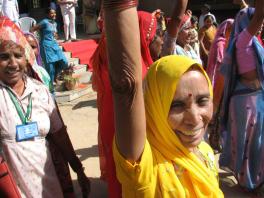The Hunger Project

Location: India
Grant Amount: $16,733.14
Grantee Website: www.thp.org
Areas of Impact: Environmental Sustainability & Climate Action, Economic Sustainability
Mission of The Hunger Project
To end hunger and poverty by strategically empowering people, in Asia, Africa, and Latin America, at the grassroots level to lead lives of sustainable self-reliance, meet their own basic needs and build better futures for their children.
Summary
Dining for Women (DFW) donations will support The Hunger Project's programs in India, specifically programs to empower elected women representatives. The Hunger Project's approach of mobilizing people for self-reliant action, empowering women as key change agents, and forging partnerships with local government comes together in one comprehensive strategy: the Panchayati Raj Campaign, in which they partner with 55 civil society organizations to train more than 70,000 elected women representatives. In turn, these women create advocacy networks for long-term, sustainable changes in their community. Women panchayat members have brought clean water to their villages, improved local sanitation, built schools, and started campaigns against domestic violence, dowry and child marriages.
Why We Love This
The Hunger Project focuses on chronic, persistent hunger as distinct from the acute famine emergencies that make the news. Less than 10% of the world's undernourished people are hungry because of famine. Chronic, persistent hunger is not due merely to lack of food. It occurs when people lack opportunity to earn enough income to be educated and gain skills to meet basic health needs and have a voice in the decisions that affect their community. The UN Food and Agriculture Organization estimates that 923 million people are hungry, worldwide. In 2007, 75 million more people were added to the total number of undernourished people relative to the period of 2003-2005, driven, for the most part, by soaring food prices. The Hunger Project does not distribute food because they do not consider food aid as a sustainable solution to world hunger. Poorly managed food distribution can destabilize local prices and undermine local production and trade, which are critical for agricultural development and long-term food security. Instead, it works in partnership with grassroots people to develop effective bottom-up strategies.
Location Map
